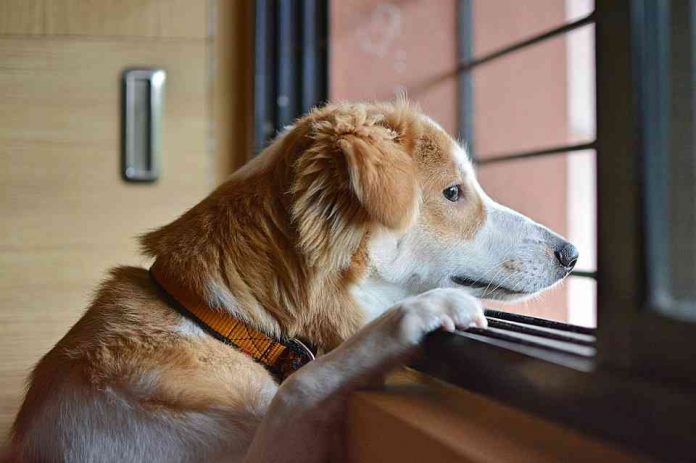Kapoor, a 29-year-old engineering professional who lives in Punjab’s Ludhiana, decided to get a dog to battle the loneliness he felt during the lockdown. But now that companies are slowly bringing employees back into offices, Kapoor is worried about how his two-year-old Labrador will fare without him.
“I have to join the office from February 1, but I am really worried about how Marcus will react to it,” said an upset Kapoor. “He has become so used to my presence and starts crying even if I go out of his sight for 15 minutes. I do not know what will happen when I will be gone for at least nine hours.”
So on the recommendation of friends who are longtime pet owners, Kapoor has been seeking the services of an animal behaviourist who can help Marcus be more independent. “I do not want him to suffer from separation anxiety,” Kapoor said.
Kapoor is far from alone in fretting about the wellbeing of his furry companion. In India, like elsewhere in the world, humans have adopted animal companions at higher rates during the pandemic. Now, as life begins to return to normal and they must leave their beloved pets at home alone, they are spending millions in an effort to keep their new family members happy.
India’s growing pet market
More Indians have become pet owners in the past few years, a trend accelerated by Covid-19. “During the pandemic, Indians definitely have become more open towards keeping a pet at home,” said Himanshu Verma, the spokesperson for Ummeed Social Welfare Society, an Uttar Pradesh-based NGO for rescuing and adopting abandoned and stray animals. “From the inclination towards a nuclear family to showing off a pedigree pet on social media, many factors are responsible for this shift. Dogs are not just an extra help to guard homes, they are now being considered as part of the family.”
Dogs are the most popular pets in Indian households, while cats have become the second-preferred option, followed by fish and birds. In 2019, Indians owned 20 million pet dogs. That is expected to rise to 31 million by 2023.
The country’s $430 million pet care market is one of the fastest-growing in the world. Its residents are so into pets that those who could not have their own during the pandemic have gone so far as to adopt them virtually.
But now, owners of pandemic pups (and cats) have a new challenge to contend with: a return to pre-pandemic life. Cities are slowly coming back to life, with an estimated 400 million people set to return to the office in India.
Hiring activity in the country recovered by 14% in December 2020 as compared to the past year, according to a recent survey by Naukri JobSpeak, an online portal for finding jobs. For those who have been unemployed, going back to work is bittersweet when it means leaving pets at home.
Pet parents have good reason to be concerned. Even the most well-adjusted household pets may become distressed if they are left home alone for too long. Being fussy about eating, waiting at the door, constant barking, crying out, biting, or chewing on household items are a few behaviours that could indicate separation anxiety in pets, according to SK Chaudhary, a veterinarian with 10 years of experience.
‘Howl’ I ever live without you?
Sniffing around for solutions, many working pet parents are looking for ways to keep their pooches entertained when they are not around.
“Now as offices resume and things go back to normal, there is a surge in queries about managing separation anxiety faced by pets,” said Anushka Iyer, founder and chief executive officer of Wiggles.in, a Bengaluru-based pet product brand.
Though the company tries to address owners’ individual concerns, it has also started a Facebook group called Wiggles Tribes where more than 6,000 pet parents exchange tips about training their pets, share recommendations on pet care, and ask about their animals’ behaviour.
Some of the most common solutions for keeping pets happy while owners are out include hiring a dog walker or a pet-sitter, booking day-boarding for cats and dogs, and buying mentally-stimulating toys.
Dogs are the most popular pets in Indian households. Photo credit: Pixabay.com
Deepanshi Kaushik, a marketing consultant from New Delhi, is investing in surveillance cameras to keep an eye on her cat when she will be in the office starting in March. “Installing a cam will help me to focus on work rather than being worried about my kitten at home,” she said.
Some pet owners are even contacting animal telepathy experts or animal communicators who claim to telepathically connect with animals over time, space, and distance. There is no evidence to suggest that such telepathic efforts work, but that is not enough for urban Indians to rule it out. In India, one can learn animal telepathy online for less than Rs 400.
Abhishek Garg, a 25-year-old telemarketing professional from Noida, Uttar Pradesh, is planning to hire an animal communicator to help understand and improve the mental health of his poodle, Puffy. “He kept me going when the stress of the lockdown started to get on my nerves,” Garg told Quartz. “[When I was] isolated from everyone and away from my family and friends, Puffy kept me hopeful. And now it’s my time to return the favour.”
Anxious pet parents mean business
Pet parents’ anxiety over leaving their animal-babies at home has come as an unexpected boost for businesses. Early in the pandemic, pet food was hard to come by as Covid-19 disturbed the supply chain, exacerbated by trade restrictions and the sudden lockdown. When it first announced the lockdown in March, the government did not include animal food as an essential item, which made it very difficult for owners to procure the items. Online portals were out of stock for months, and shop doors were shuttered.
“Vet-prescribed diet foods were hard to get,” said Poonam Gupta, owner of a pet accessory store in New Delhi. “We tried to deliver food supplies at the owners’ home but could not due to the lockdown. A lot of our customers were forced to switch to local brands and home-made food.”
Now, owners are stocking up on pet food more than ever. “There has been an increase in the demand for pet food,” Ganesh Ramani, general manager at Mars Petcare told Quartz. “After the lockdown, pet parents have started stocking up the food products. Dog treats and cat food are in higher demand.” The company, which owns more than 50% of India’s pet food market share, is expecting its sales to increase by 30% this year driven by the increase in adoptions during the lockdown.
Companies that offer in-person services like grooming, training, and boarding saw their income plummet early in the pandemic. Yet many are optimistic about recovery. After months of little spending, pet owners are now splurging on pampering for their pawed pals. Reservations for doggie day care centers are also seeing a spike, according to a number of small facilities—a trend that started before the pandemic, but has since ramped up.
“Since the unlock guidelines were announced gradually across the country, the demand for grooming services has shot up by 20%,” said Iyer of Wiggles.in. “At most times, our slots for grooming are completely booked by 48 hours in advance.” The company’s pet boarding service in Maharashtra’s Pune has seen a 25% rise in bookings since June when India started a phased process of lifting the lockdown.
Even in small towns, pet boarding facilities are in higher demand. Nidhi Garg, a veterinarian in Uttar Pradesh’s Meerut (not related to Abhishek), used to occasionally board dogs and cats in her facility. But based on the current trend, she is now planning to convert her farmhouse into an around-the-clock boarding centre.
Representational image. Photo credit: Flenssho/via Pixabay [Licensed under CC 0]
“I used to charge Rs 800 for a 10-hour lodging at my clinic, but now as we plan to start a 24/7 centre, the prices will be higher as we are shifting to a larger place,” said Nidhi Garg. She will also introduce spa and swimming pool facilities at her farmhouse, which she will turn into the boarding center later this year.
The pandemic has even carved out a new market for personal protective equipment for pets. Pets do not need to wear masks, which vets say could expose them to other respiratory problems, but ill-informed owners are taking that risk in the name of extra safety.
Though going the extra mile will surely help ease pets’ separation anxiety, owners can take some tried-and-true steps to leave their pets happy while they are out of the house.
“When you leave the house without your pet, it is vital that you tire them out,” advises Iyer. “The best thing you can do before you leave is to get them some exercise beforehand so there is no pent up energy, which at times leads to destructive behavior out of anxiety in the owner’s absence. Do not make a big deal out of your arrivals and departures, ignore your pet for the first few minutes, then calmly stroke them.”
Once you are out the door, then you can cry as much as you want.
































